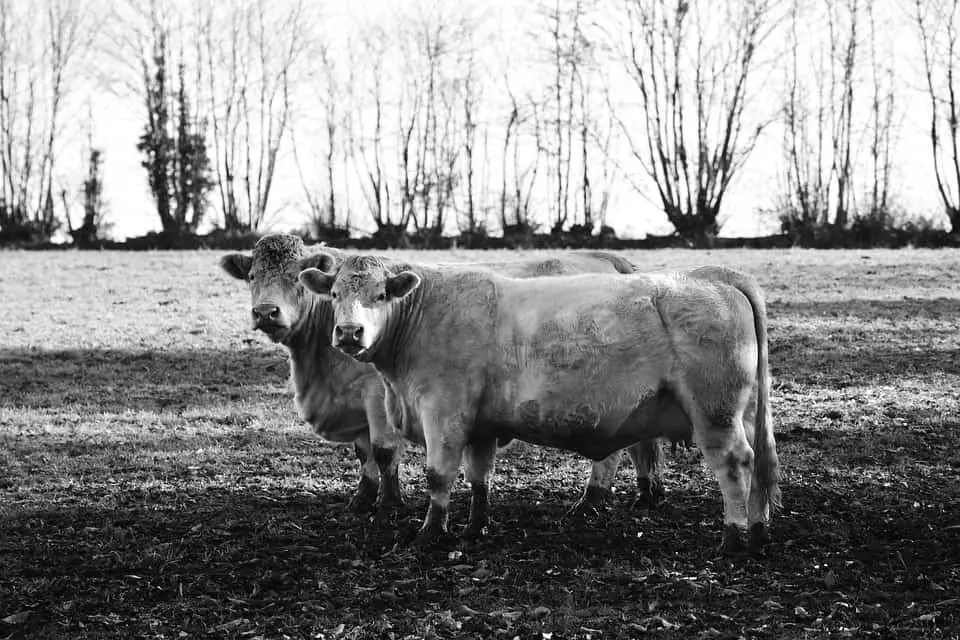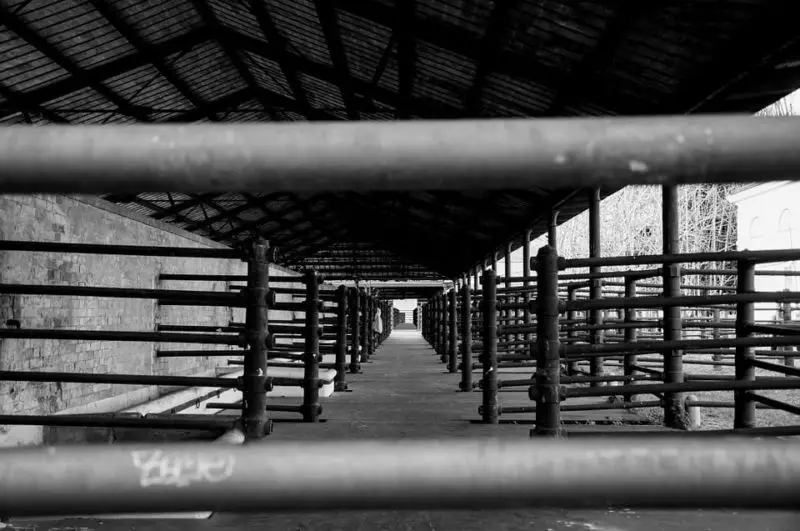The mental health of abattoir workers is rarely discussed. But these workers, who contribute to the fashion industry too, suffer more than most
By Emma Håkansson
It’s Fashion Revolution Week. A time to demand that brands answer the question: ‘Who made my clothes?’. A time to push for a fashion system that values and protects all those who work in it.
When we look carefully at a fashion supply chain – all the steps involved in creating a shoe, a bag, a sweater – we look largely at the hands who sew and stitch them. However, these people are not the only ones involved in the creation of fashion objects.
We need to examine what garments are made of, and then ask: who made that material? If it came from animals, how were they raised? And in terms of animal based fashion, who is safeguarding the mental health of abattoir workers?

The Forgotten Side Of Animal Based Fashion
The animals that pay the ultimate price for fashion suffer terribly, but we don’t often think of the humans who are complicit in their deaths. These people – the abattoir workers – deserve our consideration, too.
It’s easy to condemn these people as brutal; cruel. And yes, many of them are. PETA has shown videos of abattoir workers punching and kicking sheep, pigs and other animals. But we need to remember this is a job few would happily choose. The vast majority of those who make a living killing animals generally do so out of pure necessity.
For example, migrants and those with no tertiary or even secondary education often comprise the workforce in slaughterhouses. We do not think of them as we lace up our leather boots, zip up our calfskin purses or button up our fur coats.
Paid the absolute minimum by abattoirs, these workers complete the gruelling tasks which make the profit-driven animal agricultural industry rich. Sharp knives do not slice skin away from flesh to reduce ‘by-product waste’, but to make profit from a ‘resource’ which, when not sold (in part due to the rise of vegan leather), cost killing industries millions of dollars.
When we buy shoes made of a slaughtered cow’s skin, or knitted jumpers made of a sheep’s wool, shorn from the animal before she is slaughtered for meat (as is standard practice), we support an industry which stands strong on both a mountain of animal carcasses, and the immense suffering of human workers.

The Mental Health of Abattoir Workers
Working in a slaughterhouse is dangerous. Here are some shocking facts to illustrate this point: almost one quarter of US abattoir workers are ill or injured at any one time. In the UK alone, an average of two abattoir workers are injured every week. And late last year in Australia, Lê Tuấn Nhã, a 45-year-old father was killed, crushed to death. He had been manually pulling goat carcasses into a machine using force and speed to remove a goat’s hair from their body, but because the conveyor belt stopped working and was not tended to, he was sucked in and died painfully.
It’s not difficult to see that an industry committing atrocious violence against animal beings may not extend great care to the human beings they employ, either.
The human suffering in abattoirs is not limited to physical injury and death. Slaughtering work has been found by the Yale Global Health Review to be linked to perpetration-induced traumatic stress. Essentially, this traumatic stress disorder is one born from being ‘the direct reason for another being’s trauma’.
Most of us would be deeply mentally disturbed by taking the lives of thinking, feeling animals, day in and out, for the sake of our needless desire for animal-based food and fashion. We cannot justify paying for products which demand someone else go through this trauma for us. The testimony I read of one abattoir worker stated simply that ‘you become emotionally dead’ doing this work.
Devastatingly, this psychological damage sews the seeds of violence in the communities these workers live in too. Incidences of violent offences, domestic violence, sexual assault and rape are all notably higher in areas around abattoirs, where the killing work takes place.
Even before animals are slaughtered, the burden of knowing one is responsible for the taking of life hurts people’s souls. Ultimately, the kindness innate in most of us needs to be deeply buried in the psyche to allow workers to send animals to their deaths every day.

My Hope For The Future
Multiple farmers who have come to move away from animal agriculture, and to plant-based vegan farming, have shared their experiences of raising animals they know and connect with for death. Bob Comis, a pig farmer turned vegan, shared his and the stories of the pigs he raised in The Last Pig.
During the filming process, he told the team he might not be able to get out of bed some days, already struggling with severe depression, and also feeling unable to feel the ‘fullness of [his] own self’ until he lived ‘a life free from killing’.
Similarly, Jay Wilde, a cattle farmer turned vegan, shared his story in 73 Cows. Jay calls elements of his previous work ‘soul destroying’, while his wife Katja shares that giving up on farming animals changed Jay for the better: ‘I think the biggest change is, I think that he talks more… that is just so beautiful to see,’ she said.
Sure, it’s important to demand a better life for garment workers, especially now, during Fashion Revolution Week. But even before our shoes, accessories and garments are stitched together, we also need to consider the mental health of abattoir workers. And of course, we must also reflect on the stolen lives of animals, taken by an unforgivingly brutal system, fuelled by consumer demand.
This Fashion Revolution Week, may we extend our compassion and consideration to these people, these lives. May we support cruelty-free, non-industrialised farming methods, for example.
May we support farmers who grow earth-friendly, plant-based fibres like cotton or hemp, or who harvest bamboo and wood for closed-loop system lyocell materials.
May we support the rise of eco-friendly vegan fashion. And may more people go vegan.
May we support cruelty-free innovations and designs in the form of man-made and biomass-based materials with a far lesser environmental impact than those born of animal suffering.
May we demand that abattoir workers get the mental health support they so badly need.
And finally, may we refuse to accept a system in which farmers feel they must ‘switch’ their love for animals off, because a world where kindness is a tribulation is not a safe, happy or truly ethical one, for anyone.
About the author: Guest writer Emma Håkansson is a freelance journalist who has written on veganism and ethical and sustainable fashion for publications including Good On You, Plant Based News, The Green Hub, Trend Prive and Vilda Magazine. You can see more of her writing here.
- Meet Ethical Fashion Designer Kelli Donovan - July 26, 2025
- 7 Of The Best Clean At Sephora Makeup Brands - July 13, 2025
- Eluxe Horoscopes For July 2025 - June 30, 2025
